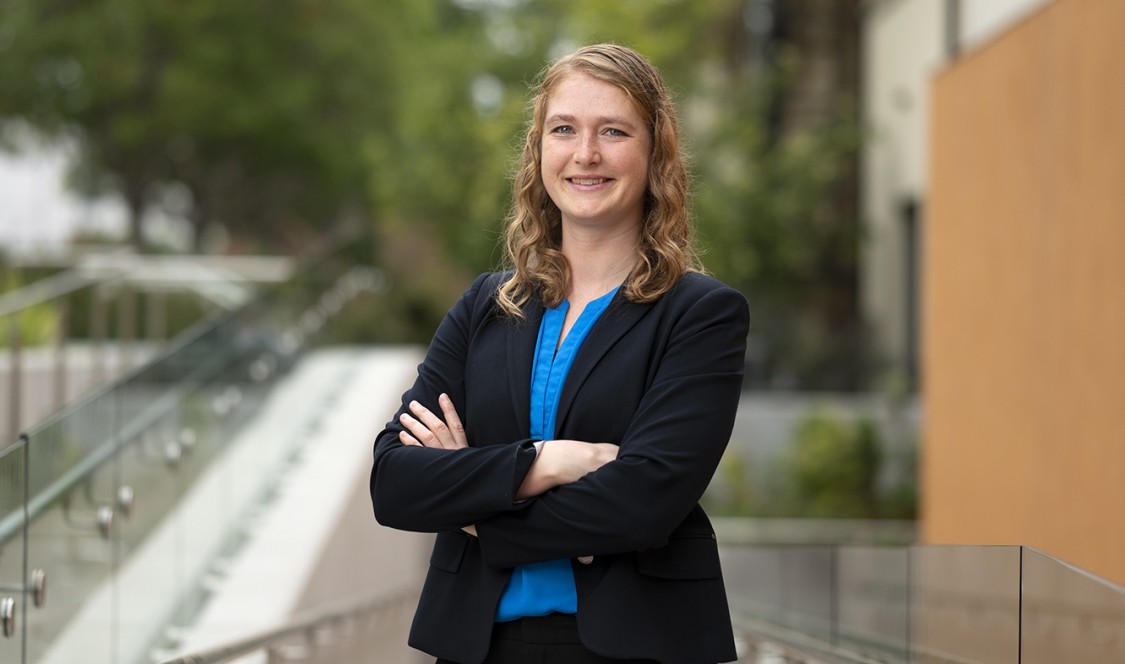The National Science Foundation has awarded CMC professor Sarah Cannon a $174,583 research grant to study math and computer science with applications to U.S. democracy. Her research aims to improve electoral maps for equitable voter representation among all demographics at the local, state, and federal level.
With NSF support, Cannon will integrate CMC students into her study of the application of Markov chains—a statistical process used by computer scientists to understand large, complex data sets, such as voting demographics. Cannon began studying Markov chains as a Ph.D student and applied those concepts to U.S. democracy as an NSF Postdoctoral Fellow at UC Berkeley before joining CMC’s Department of Mathematical Sciences in 2019.
“I’m excited to introduce students to how math and computer science can be used in meaningful and impactful ways,” said Cannon, an assistant professor of mathematics. “By connecting mathematical concepts with real-world problems, students are motivated to explore and learn about how we can use them to make a positive difference.”
Cannon’s research blends CMC’s liberal arts strengths in mathematics, computer science, and government. She uses mathematical tools to ensure computer science processes—like algorithms—work when applied to complicated and pressing national challenges. This includes issues of equity in the voting process, most notably gerrymandering, which manipulates the boundaries of voting districts to gain political advantage.
Data scientists also use random samples, generated by algorithms like Markov chains, to determine whether gerrymandering has occurred. Cannon’s research is focused on ensuring the algorithms behind those samples are random enough to provide a proper baseline for comparison.
“We need fair, unbiased ways of detecting and quantifying gerrymandering, and we need them to be sensitive to the particulars of what’s going on in any given state,” Cannon said. “We also want to give mathematical guarantees about these sampling processes so that we can have full confidence in the conclusions reached.”
With NSF support, Cannon will incorporate her research on Markov chains into a new upper division course at CMC, the Mathematics of Political Redistricting. The curriculum will cover the literature of how and why scientists use mathematics and computation to understand redistricting, while also investigating the mathematical concepts behind these studies. She envisions the course serving both math and data science majors, as well as quantitatively inclined students from other majors such as government and public policy.
“This course offers students a chance to learn and apply quantitative skills,” Cannon said. “Even if they don’t use these exact mathematical techniques in their future work, they will learn to approach problems quantitatively, develop models, reason about their effectiveness, and make conclusions. For students interested in government and public policy, it’s also a chance to see how quantitative methods can be helpful and beneficial, when carefully and thoughtfully applied.”
Cannon hopes her students will find themselves drawn to mathematics in the same way she was as an undergraduate student.
“I had never considered research until one of my professors at Tufts University, Diane Souvaine, approached me after I’d done well in her algorithms class,” she said. “As soon as I began work on that research project, I knew I liked theoretical research and wanted to keep doing it. That research project was what started me on the career path to becoming a professor.”
Cannon’s first major research grant is being awarded through the Research Initiation Initiative (CRII), a program of the National Science Foundation’s Directorate for Computer and Information Science and Engineering. CRII is designed to help scientists establish their research careers.

